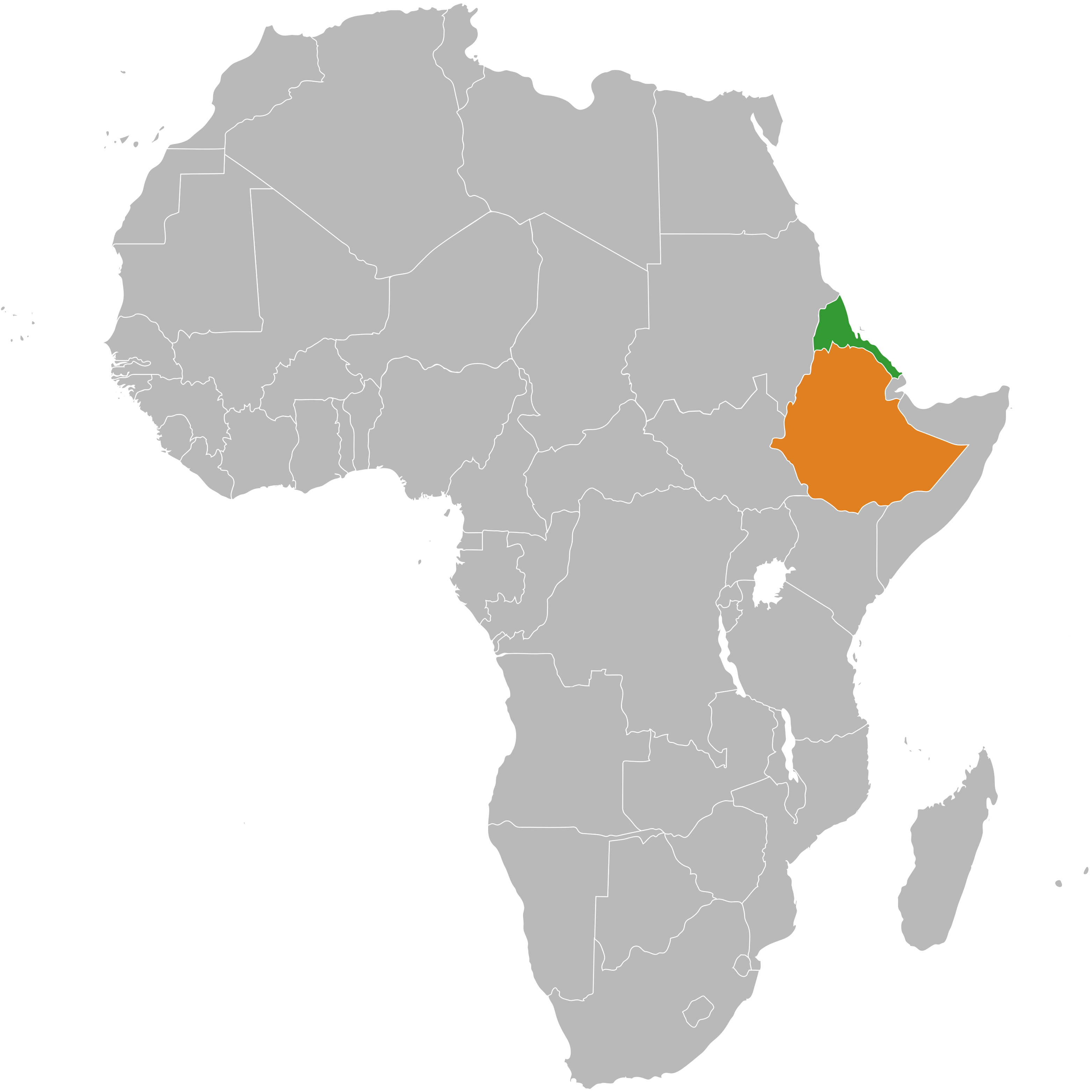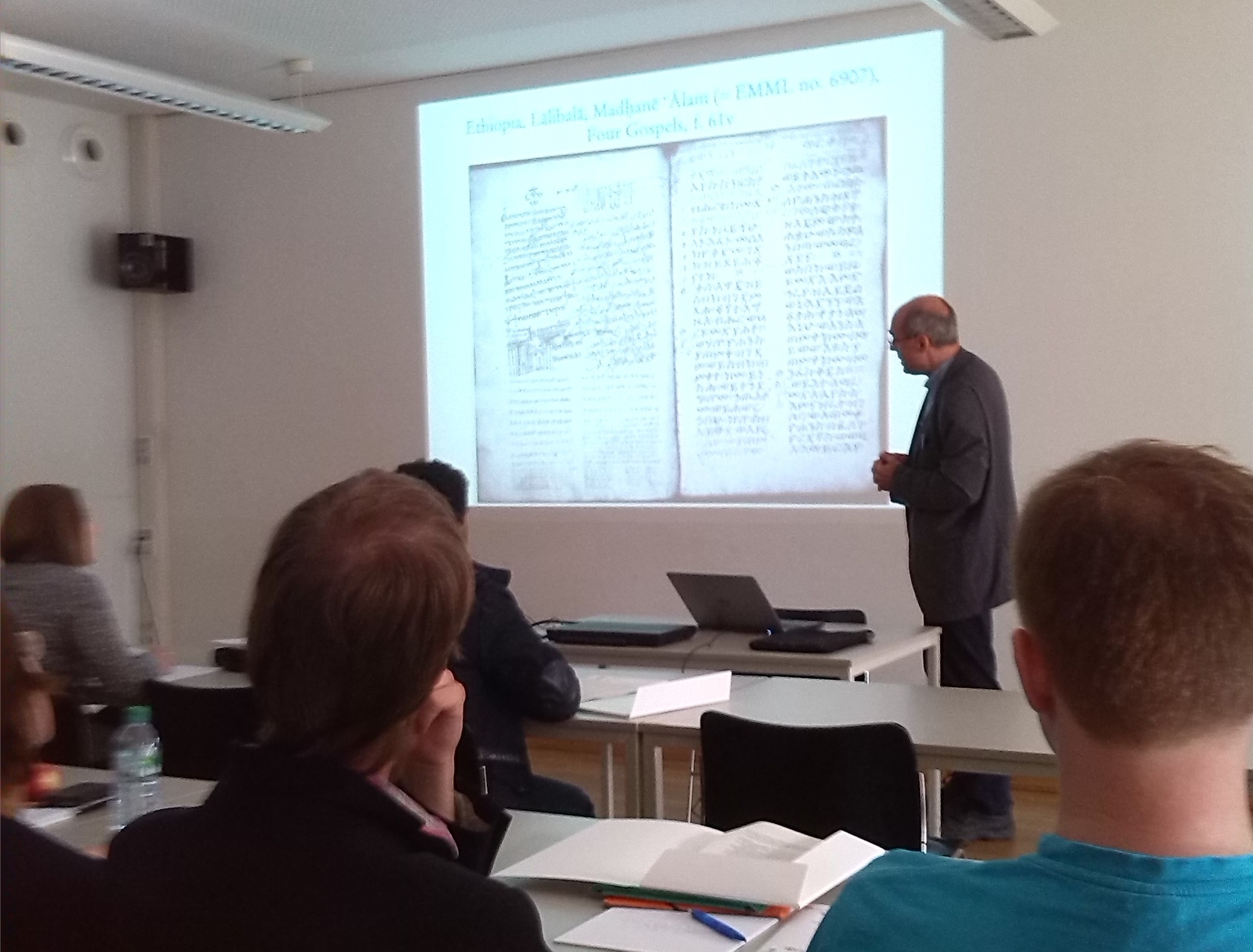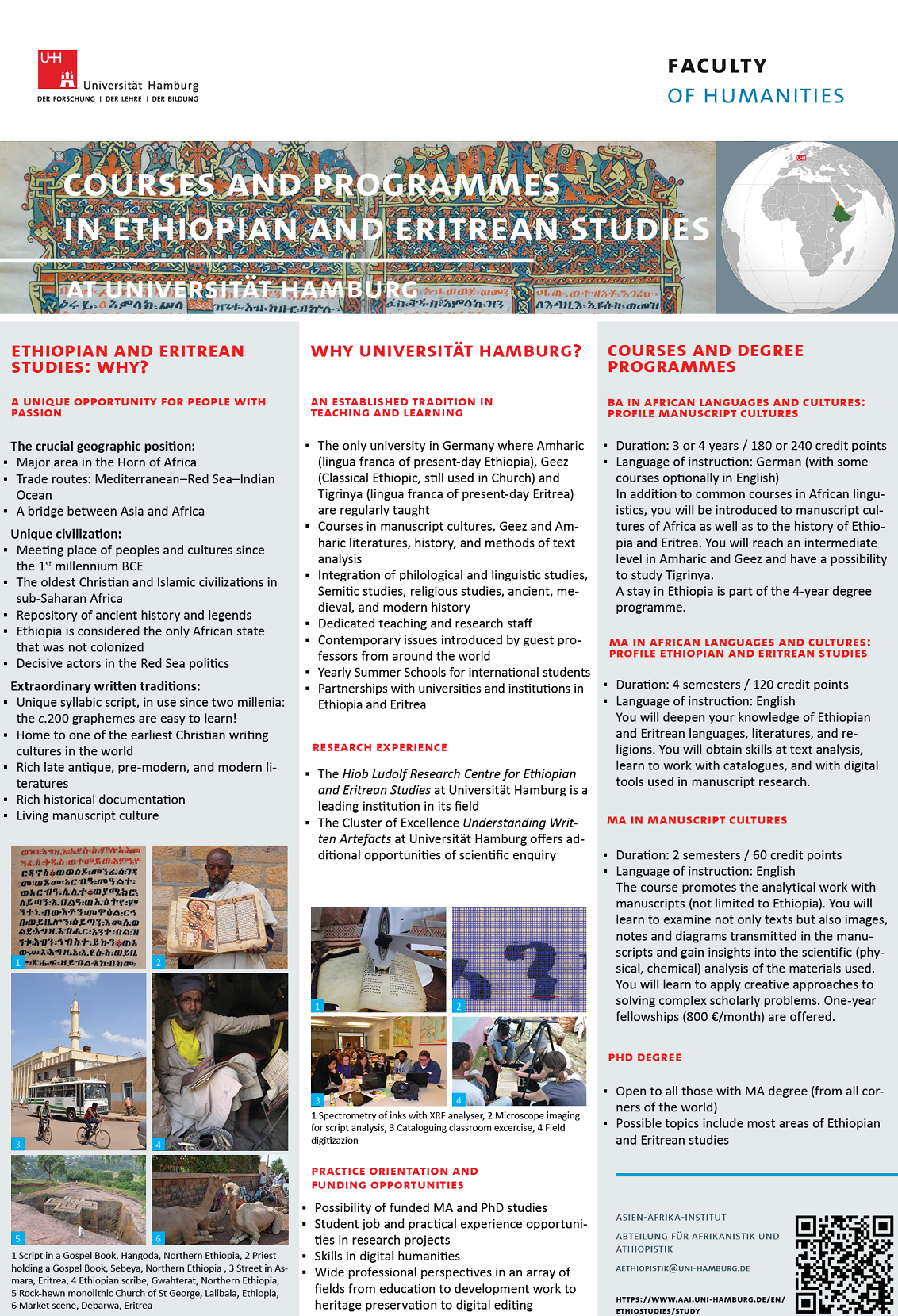Courses and Degree Programmes in Ethiopian/Eritrean Studies
Why engage in Ethiopian and Eritrean studies?
- meeting place of peoples, cultures, and languages since the first millennium BCE
- a continuously documented history, from Antiquity to the age of the Global South
- the oldest Christian and Islamic civilizations in sub-Saharan Africa
- repository of ancient history and legends, from the Ark of the Covenant and the Queen of Sheba to Prester John
- an essential component of the ancient and modern Semitic and Afro-Asiatic world
Pages from a Book of the Rite of the Holy Week, Addiqaharsi, Northern Ethiopia
- major area in the Horn of Africa
- trade routes linking the Mediterranean Sea through the Red Sea to the Indian Ocean
- a bridge between Asia and Africa, connecting the Near East to the African inlands
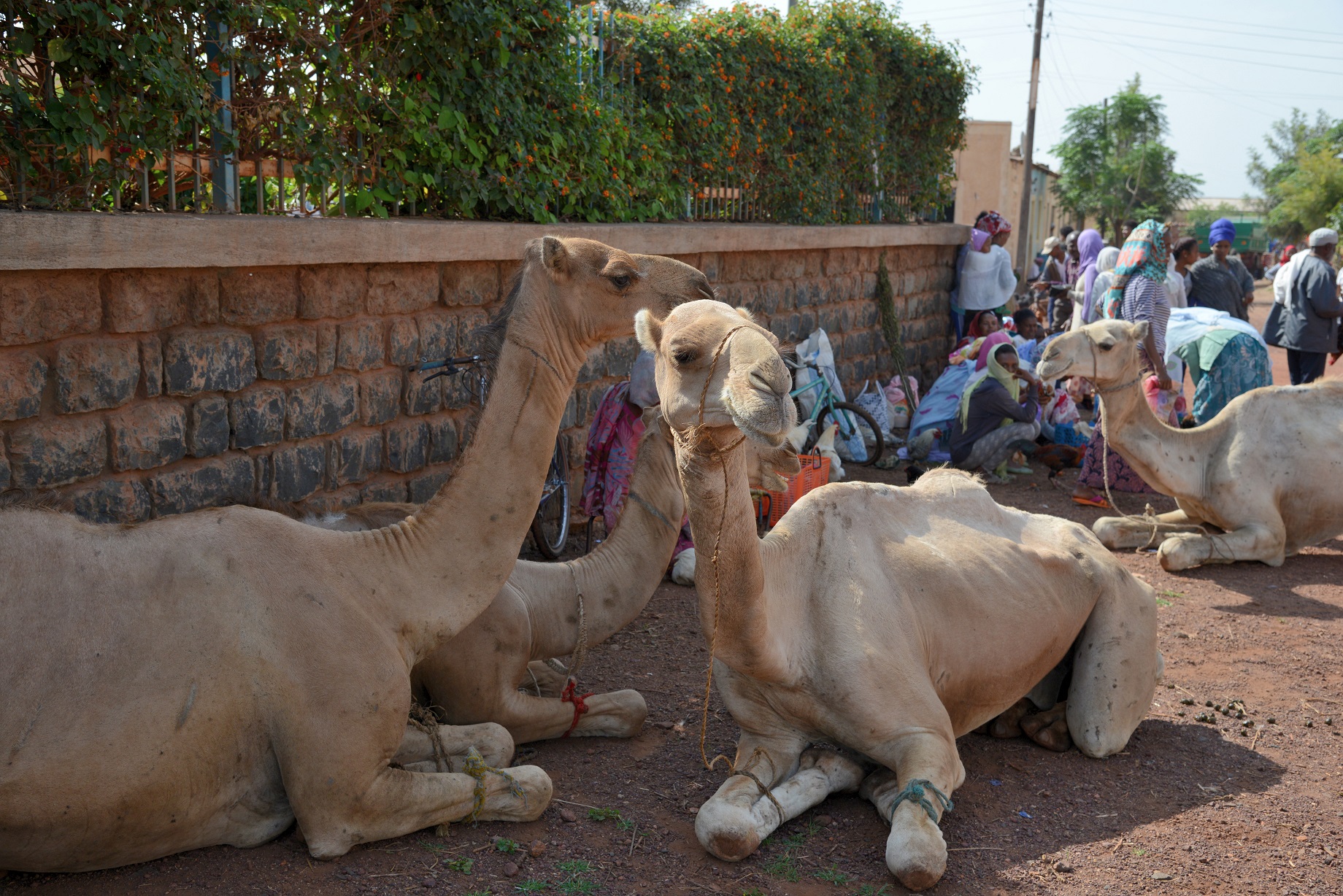 Market scene in Debarwa, Eritrea
Market scene in Debarwa, Eritrea
- Ethiopia hosts the headquarters of the African Union
- Ethiopia is considered the only African state that did not experience colonization
- Ethiopia is a symbol of Pan-Africanist Movements (including Ethiopianism and Rastafari)
- Eritrea and Ethiopia are decisive actors in the Red Sea politics
- Sizeable Eritrean and Ethiopian diasporas in Europe and North America
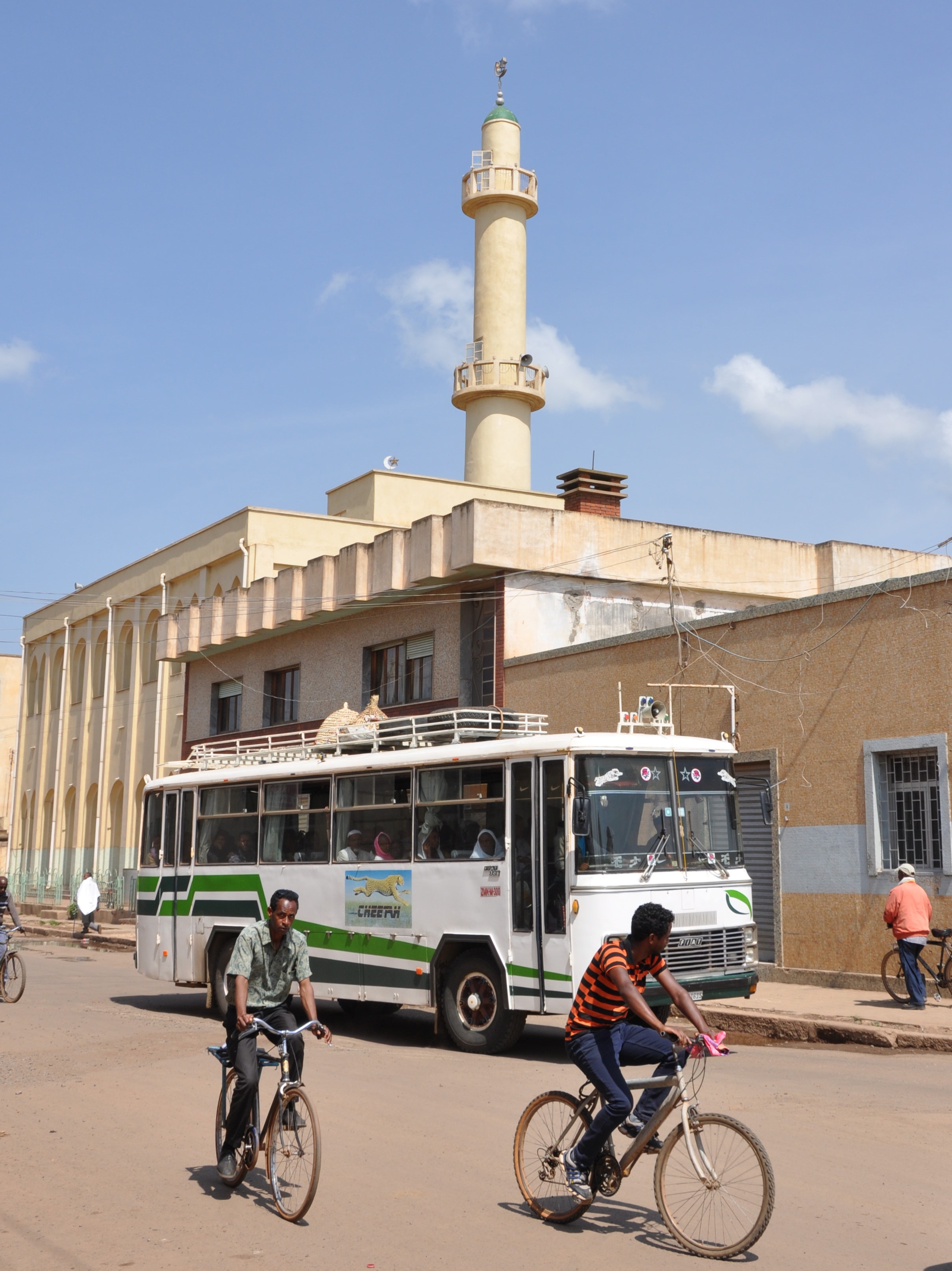 Street in Asmara, Eritrea
Street in Asmara, Eritrea
- a unique syllabic script, in use for two millenia, with c.200 syllabic signs (it is easy to learn: try writing your name in Amharic!)
- a still largely unexplored world of literary and artistic creativity
- a living manuscript culture
- home to one of the earliest Christian writing cultures in the world
- the Abba Garima Gospels are among the earliest extant illuminated manuscripts
- 1600-year-old literary heritage (from Late Antiquity and Middle Ages to modern times)
- treasury of Jewish and Christian apocrypha
- rich translational literature (from Greek, Arabic and beyond)
- flourishing modern literatures in an array of local languages
- archival records documenting many centuries of Ethiopian, Eritrean, and African history
- an extraordinary wealth of oral traditions
Ethiopian scribe, Gwahterat, Northern Ethiopia
Jump to Courses and Degree Programmes in Ethiopian and Eritrean Studies
Why Ethiopian and Eritrean Studies at Universität Hamburg?
UHH is the only university outside Africa where several Ethiopian and Eritrean languages are regularly taught:
- Amharic (lingua franca of present-day Ethiopia)
- Geez (Classical Ethiopic, still used in Church)
- Tigrinya (lingua franca of present-day Eritrea)
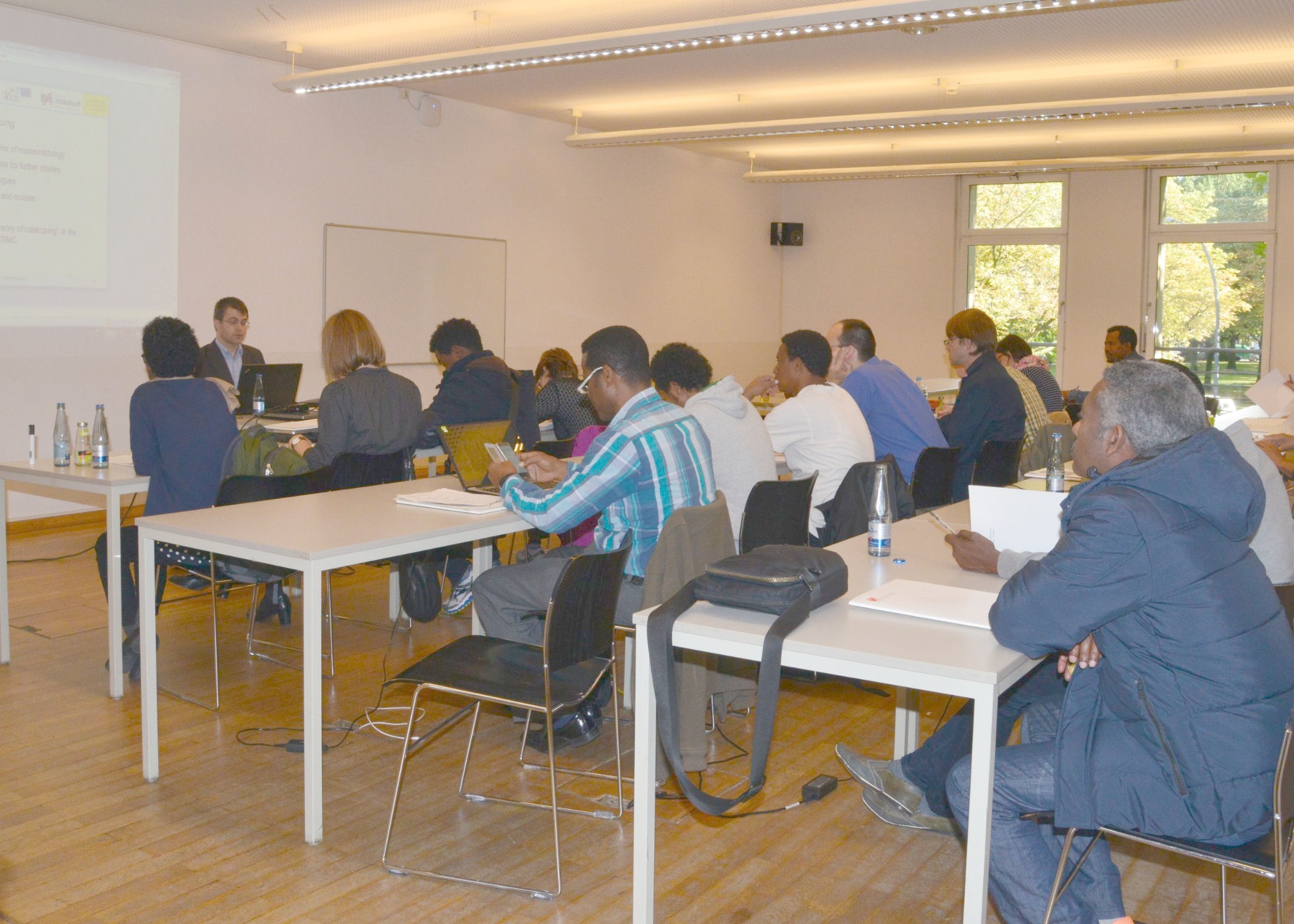 A lecture in manuscript cataloguing
A lecture in manuscript cataloguing
The Hiob Ludolf Centre for Ethiopian and Eritrean Studies is the leading institution in the field,
- carrying out long-term and fundamental investigation on the Horn of Africa
- pursuing research into Ethiopian and Eritrean languages and manuscript cultures
- documenting and analyzing textual and literary traditions
- functioning as a hub to an international community of scholars
- editing international journals and monograph series
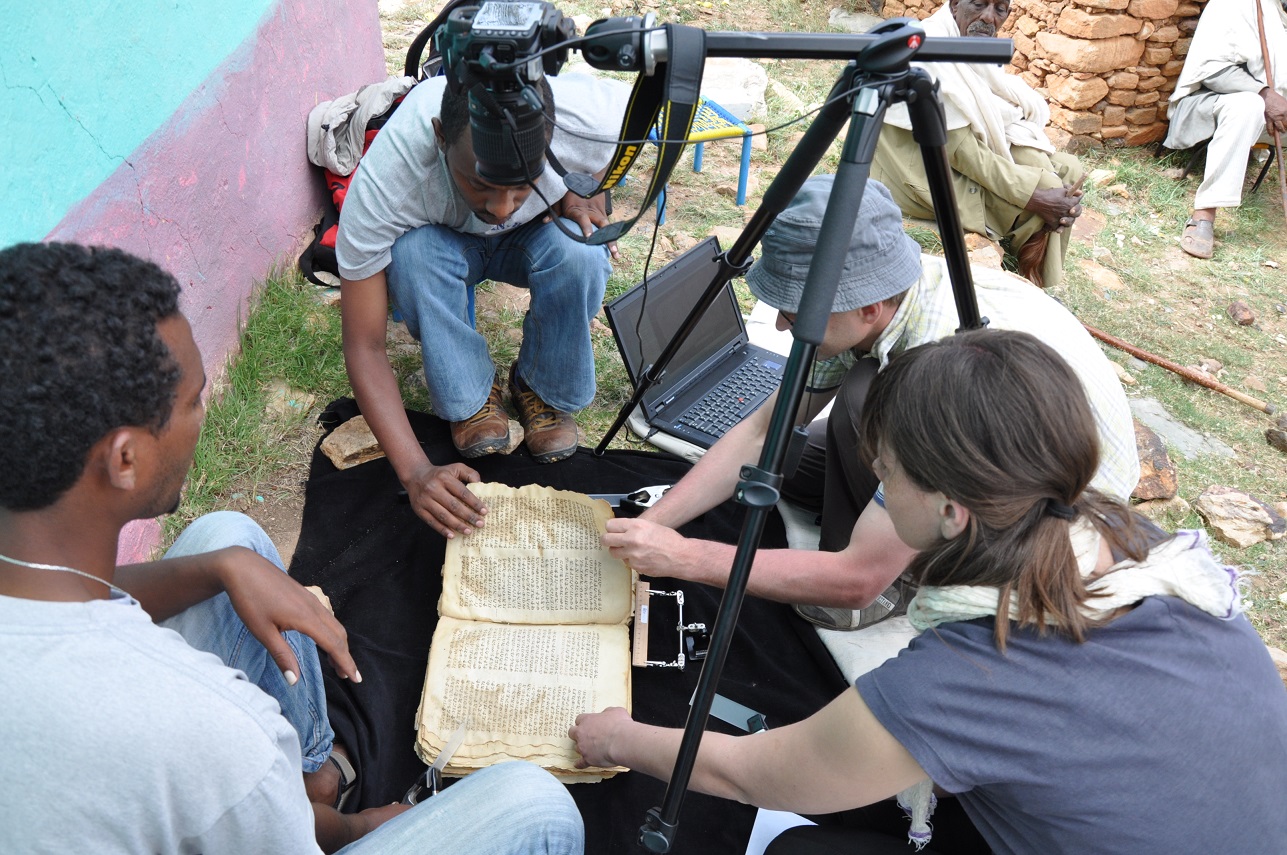 Field digitization
Field digitization
- introduction to methods of manuscript studies and history of manuscript cultures
- integration of Geez and Amharic studies into broader philological and linguistic contexts
- methods of textual and literary analysis and history of Geez and Amharic literatures
- introduction to Semitic and religious studies, and ancient, medieval, and modern history
- check here for a list of courses from the recent semesters
During the 2019 Summer School in Addis Ababa
- Addis Ababa University
- Bahir Dar University
- Debre Markos University
- Mekele University
- Research and Documentation Centre, Asmara
- University of Gondar
Prof. A. Bausi (UHH) greeting Dr Hirut Kassaw (Minister of Tourism and Culture, FDRE)
- guest professors (supported by the DeutschÄthiopischeStiftung) lecture on contemporary issues concerning the Horn of Africa
- regular international Summer Schools in Ethiopian and Eritrean Manuscript Studies
- involvement in the activities offered by the Cluster of Excellence Understanding Written Artefacts
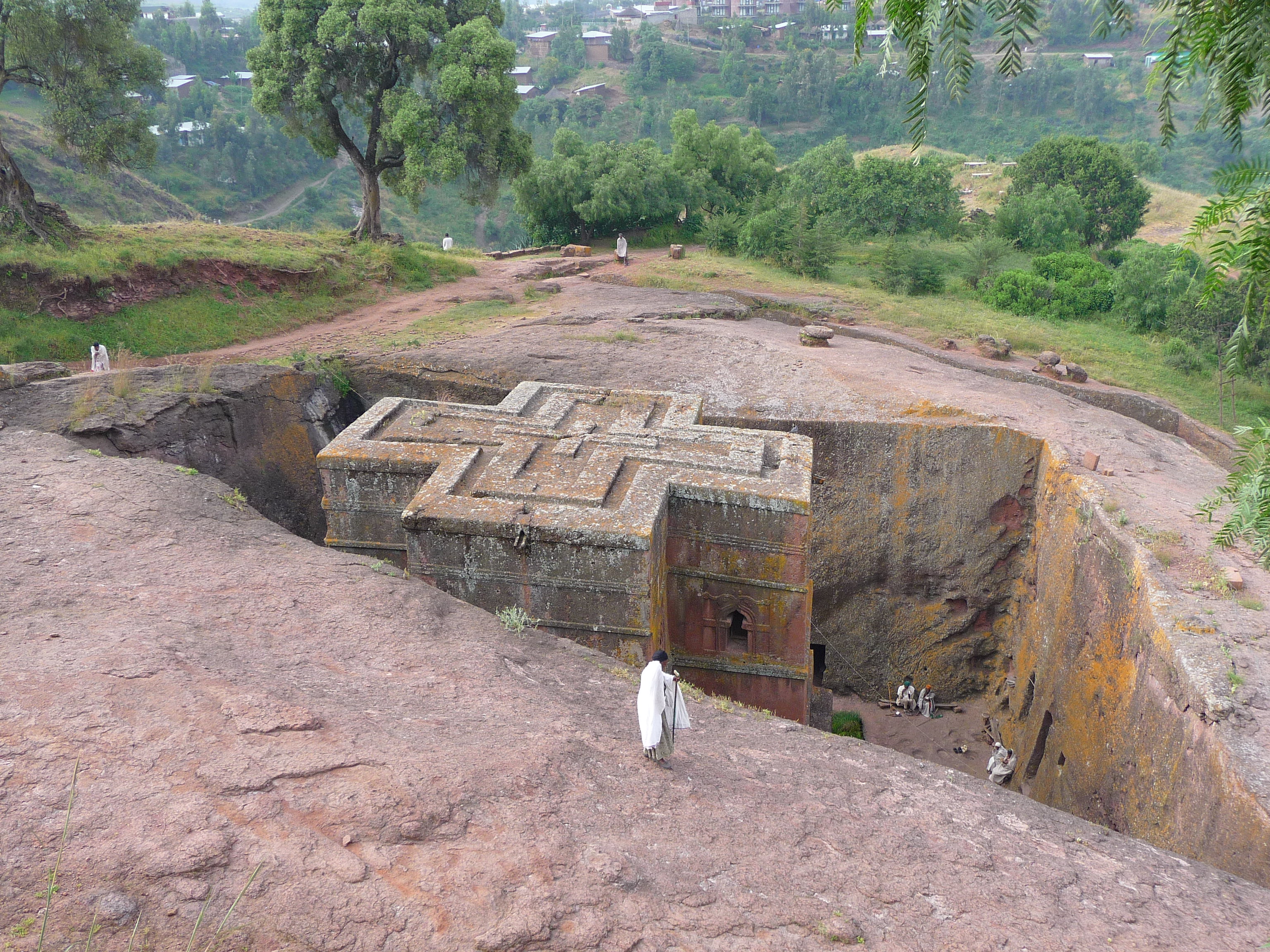 Rock-cut church Beta Giyorgis, Lalibala, Ethiopia
Rock-cut church Beta Giyorgis, Lalibala, Ethiopia
- teachers and researchers are leading specialists in their respective fields
- prominent international scholars as guests
Ethiopian highlands (Qaqama)
- well-furnished specialized libraries providing access to most relevant publications in the field (the library of the HLCEES, the library of the Asien-Afrika-Institut, the CSMC Reference Library, all in walking distance to one another)
- reading rooms with computer access
- smart screen and/or projector-equipped meeting rooms can be used on request
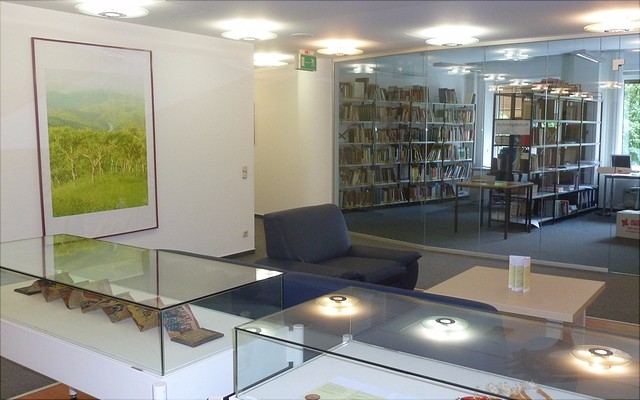 The library at HLCEES
The library at HLCEES
- possibility of funded MA and PhD studies
- student job and practical experience opportunities in research projects
- a vibrant multilingual human and cultural environment
- skills in digital humanities
- wide professional perspectives in an array of fields, from education to development work to heritage preservation to scholarly editing
- Erasmus and international partnerships
- rewarding field work experience, discovering new texts and manuscripts
Scholars of the Hiob Ludolf Centre for Ethiopian and Eritrean Studies offer additional support to interested students at all stages.
Manuscript fieldwork in Ethiopia
Jump to Courses and Degree Programmes in Ethiopian and Eritrean Studies
Courses and Degree Programmes in Ethiopian and Eritrean Studies
If you want to discover more about Ethiopia and Eritrea you can enroll in one of the programmes that best suits you:
BA in African Languages and Cultures: Profile Manuscript Cultures
- duration: 3 or 4 years / 180 or 240 credit points
- language of instruction: German (English possible in some classes)
- students can choose this programme as their major or minor
In addition to common courses in African linguistics, students will be introduced to manuscript cultures of Africa as well as to the history of Ethiopia and Eritrea. They will reach an intermediate level in Amharic and Geez and have a possibility to study Tigrinya.
A one-semester or two-semester stay in Ethiopia (or in another African or European country with a partner university) is part of the four-year degree programme.
Fachspezifische Bestimmungen BA African Languages and Cultures (in German)
List of courses in Ethiopian and Eritrean Studies (for BA and MA)
Priest holding a Gospel Book, Sebeya, Northern Ethiopia
If you already have your BA degree (in African or Semitic Studies or in a related field: admission on application based upon your diploma supplement) you can pursue one of the two MA-degree programmes at Universität Hamburg:
MA in African Languages and Cultures: Profile Ethiopian and Eritrean Studies
- duration: 4 semesters / 120 credit points
- language of instruction: English
The Profile in Ethiopian and Eritrean studies aims to further develop graduates’ knowledge of Ethiopian languages, literatures, cultures and religions. It gives the opportunity to learn the philological method and to apply it to the texts transmitted in manuscripts. Students will have opportunities to study concepts, methods and approaches used in philology and apply them to texts transmitted in manuscripts. They will acquire ability in analyzing texts in Ethiopian languages, both linguistically and philologically, and thus gain insight into such areas of knowledge as history (especially ancient and premodern), historical linguistics, religious history of Ethiopia and Eritrea, literature, and manuscript studies.
Fachspezifische Bestimmungen MA African Languages and Cultures (in German)
List of courses in Ethiopian and Eritrean Studies (for BA and MA)
Spectrometry of inks with XRF analyser
MA in Manuscript Cultures
- duration: 2 semesters / 60 credit points
- language of instruction: English
The MA programme Manuscript Cultures (MAMC) is a one-year course that conveys central topics in the field of general manuscript research combined with specific skills. The degree programme promotes the independent, critical, and analytical work with manuscripts. Students will learn how to conduct cultural and scientific examination of the texts, images, notes and diagrams contained in the manuscripts, including the scientific material analysis. They will develop creative approaches to solving complex scientific and scholarly questions. The range of manuscript cultures covered goes well beyond Ethiopia and Eritrea, including other African written traditions, but also Asia and Europe.
Funding opportunities: one-year fellowships of 800 Euro per month are available to the students of the MAMC on application.
International MA Manuscript Cultures - Application information (in English)
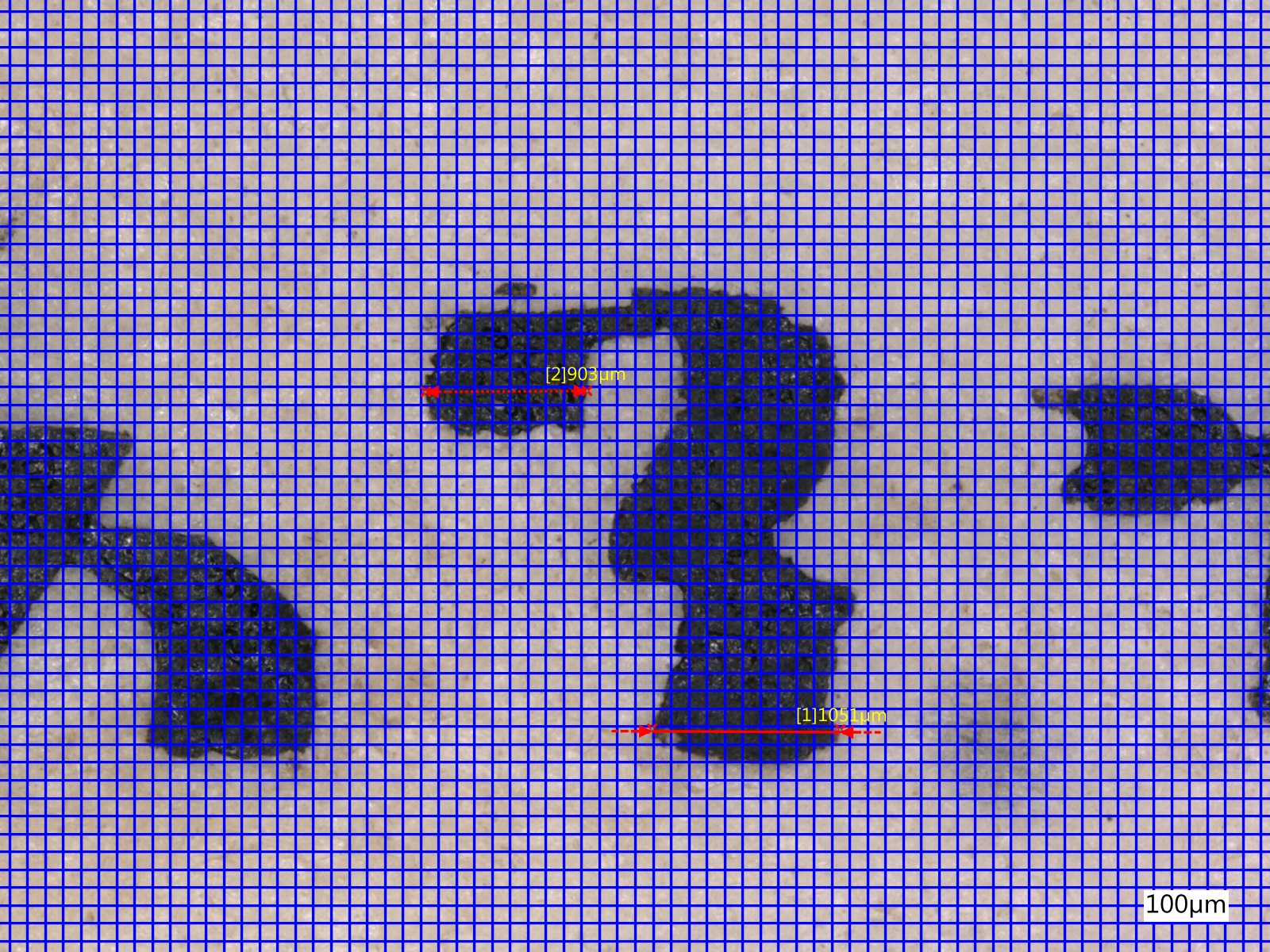 Microscope imaging for script analysis
Microscope imaging for script analysis
If you already have a MA you can pursue a PhD-degree programme at Universität Hamburg:
PhD in Ethiopian Studies (Äthiopistik)
- for those with MA degree (from anywhere in the world): prerequisite: 300 credit points
- language of dissertation: German or English
- a vast array of topics and methods
Scholarships may be offered: within the existing Graduate schools (in particular, Graduate school of the Cluster of Excellence Understanding Written Artefacts), by the ongoing projects, and by the Universität Hamburg. HLCEES strongly encourages foreign students to apply to foundations such as the German Academic Exchange Service (DAAD) which has successfully funded a number of PhD students in Ethiopian and Eritrean Studies in the past years.
 XML digital edition and its web visualization
XML digital edition and its web visualization

